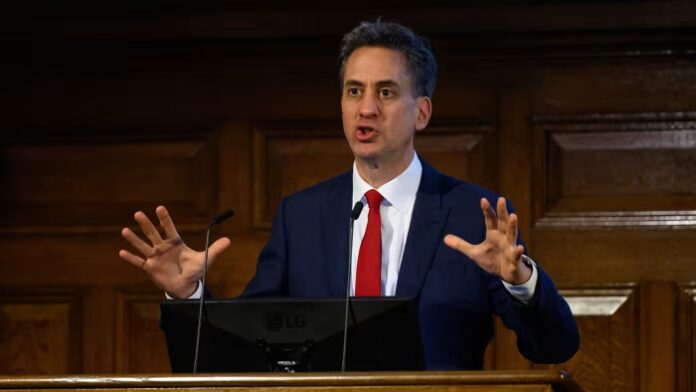Stay informed with free updates
Simply sign up to the UK tax myFT Digest — delivered directly to your inbox.
Energy secretary Ed Miliband has given the strongest hint yet that the chancellor could cut VAT from household energy bills at next month’s Budget, saying the government must take steps to tackle the cost of living crisis.
Miliband said that chancellor Rachel Reeves “understands that we face an affordability crisis in this country”, even as she prepares to raise other taxes to plug a fiscal gap.
On Sunday, the minister was asked directly if the government was considering “scrapping” 5 per cent VAT on energy bills at the November Budget, and told the BBC: “The whole of the government, including the chancellor, understands that we face an affordability crisis in this country.
“We face a cost of living crisis, a long-standing cost of living crisis that we need to address as a government.”
His comments will fuel speculation that Reeves is planning a select number of giveaways to soften the impact of tax rises elsewhere, as the chancellor looks to plug a fiscal hole estimated at £20bn-£30bn.
They come as Labour faces pressure over rising energy bills after pledging to cut costs for consumers, with energy bosses sounding a warning over the increasing cost of electricity in the UK this week.
Miliband acknowledged the government’s “difficult fiscal circumstances” but said it was “looking at all of these issues” including ways to lower energy costs, which have become a lightning rod for criticism of higher inflation.
As part of his broader clean energy push, Miliband on Sunday outlined plans to help train additional workers in the sector, which he claims will create 400,000 additional jobs by 2030, including planning five new “technical excellence colleges”.
The so-called Clean Energy Jobs Plan includes 31 “priority” occupations including plumbers, electricians and welders, with the government billing it as potentially opening up higher paying jobs for younger people, former oil and gas workers and military veterans throughout the UK.
Reeves has, however, acknowledged in recent days that public spending will have to be cut in her November Budget alongside further tax rises, promising that “the numbers will always add up with me as chancellor”.
But Labour, which has slumped to just 20 per cent in the latest YouGov poll, is aware of the need to provide some relief for struggling families as it tries to ward off the threat from Nigel Farage’s populist Reform UK party.
The so-called energy price cap, which governs the majority of household’s gas and electricity costs, has risen to £1,755 per year for a home with average usage from about £1,200 in 2019, prior to the pandemic and Russia’s disruption of energy supplies.
Adjusted for inflation prices are about £200 a year higher for the average household than in 2019, though larger homes with higher usage can face substantially higher bills.
VAT, which is normally charged at 20 per cent, is already applied at a reduced rate of 5 per cent on household gas and electricity bills, including on standing charges for connection to the grid.
Scrapping it would save a household with average usage about £86 a year, according to the charity Nesta, and cost the government about £2.5bn a year.
Last month Nesta’s Marcus Shepheard questioned whether a VAT cut was the best way to lower energy bills, arguing it was poorly targeted “with most of the absolute benefit flowing to the wealthiest households”.
Shepheard suggested alternatives such as focusing the VAT cut only on electricity rather than gas or using funds for debt forgiveness for those still paying off large bills accrued at the peak of the energy crisis.
The Treasury said: “We do not comment on speculation.”
Source link






